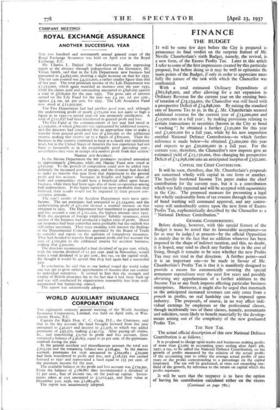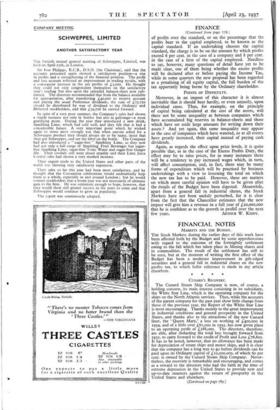THE BUDGET
FINANCE
IT will be some few days before the City is prepared to pronounce its final verdict on the surprise feature of Mr.
Neville Chamberlain's sixth Budget, namely, the revival, in a new form, of the Excess Profits Tax. Later in this article I refer to some of the first impressions created by this particular proposal, but before doing so it may be well to epitomise the main points of the Budget, if only in order to appreciate more funk- the nature of -the task with which the Chancellor was confronted. • With a total estimated Ordinary Expenditure of £862,848,000, and. after - allowing for a net expansion in Ordinary Revenue for the current year on the existing basis of taxation of L23,234,000, the Chancellor was still faced with a prospective Deficit of Liii,898,0o0. By raising the standard rate of Income Tax to 5s. in the ,C, Mr. Chamberlain secured additional revenue for the current year of Li3,000,000 and £15,000,000 in a full yer--; by making provisions relating to certain transactions in securities (known in the City as bond " washing ") he obtained a further L15o,000 for this year and Li,000,000 for a full year, while by his new imposition entitled National Defence Contribution—to which further - reference is made below—he obtained £2p00,000 this year and expects to get £20,000,000 in a full year. For the current year, therefore, the Chancellor's new imposts give an estimated yield of Li 5,t5o,000, thus changing his prospective Deficit of £14,898,00o into an anticipated Surplus-Of £252,000.
CAPITAL THE CHIRP CONTRIBUTOR.
- It will be seen, therefore, that Mr. Chamberlain's proposals are concerned wholly with capital in one form or another.
The heavily burdened Income Tax payer ;makes the chief contribution for ' the current year, but it is a contribution which was fully expected and will be accepted with equanimity in the City. The proposed measure for preventing a legal but wholly undesirable form of tax evasion through the system of bond washing will command approval, and any contro- versy will undoubtedly centre upon the new form of Excess Profits Tax, euphemistically described by the Chancellor as a " National Defence Contribution."
GENERAL CONSIDERATIONS.
Before dealing,- however, with this special feature of the Budget it must be noted that its favourable acceptance—so far as may be, judged at present—by the official Opposition is mainly due to the fact that no addition whatever has been imposed the shape of indirect taxation, and this, no doubt, it is hoped; may tend to Cheek -any further rise in the cost of living,-though it -remains to be seen whether the new Profits Tax may not tend in that direction.' A further point—and it is as important ofieto -be made in favour of Mr. Charnberfain's-Profits Tax is that it is manifestly designed to provide a means for automatically covering the special armament expenditure over the next few years and possibly obviating any apprehensions of a further addition to the Income Tax or any fresh. imposts affecting particular business enterprises. Moreover, it might also be urged that inasmuch as the anticipated increased revenues can only come from a growth in profits, no real hardship can be imposed upon industry. The proposals, of course, in no way affect indi- vidual earnings by employees or the professional classes, though incidentally two of these classes, namely, accountants and solicitOrs, seem likely to benefit materially by the develop- ments arising out of the complexity of the new graduated Profits Tax. .
THE NEW TAX.
• The actual official description-of this new National Defence Contribution is as follows : It is propined to charge upoii trades and businesses making profits of more than £z,000 m accounting years ending after April 5th, 1937, a tax, to be called the National Defence Contribution, on the growth of profits measured by the relation of the actual profits of the accounting year to either the average actual profits of past years or the profits corresponding to a percentage on the capital employed. The tax will be graduated, at rates not exceeding one- third of the growth, by reference to the return on capital which the profits represent.
It will be seen that the taxpayer is to have the option of having his contribution calculated either on the excess (Continued on page 780.) FINANCE
(Continued from page 778.)
of profits over the standard, or on the percentage that the profits bear to the capital employed, to be known as the capital standard. If an undertaking chooses the capital standard, the charge is to be on the amount by which profits exceed 6 per cent. in the case of a company and 8 per cent. in the case of a firm of the capital employed. Needless to say, however, many questions of detail have yet to be made dear, one of them being whether the excess profits will be declared after or before paying the Income Tax, while in some quarters the new proposal has been regarded as a penalising of all equity capital, the full burden of the tax apparently being borne by the Ordinary shareholder.
POINTS OF DIFFICULTY.
Moreover, in an impost of this character it is almost inevitable that it should bear hardly, or even unjustly, upon individual cases. Thus, for example, on the principle of capital being calculated at the cost of the assets, will there not be some inequality as between companies which have accumulated big reserves in balance-sheets and those which have set aside large amounts for writing down their assets ? And yet again, this same inequality may appear in the case of companies which have watered, or at all events have greatly increased, their capital instead of paying cash dividends. • Again, as regards the effect upon price levels, it is quite possible that, as in the case of the Excess Profits Duty, the effect may be to raise prices, for in many instances there will be a tendency to pay increased wages which, in turn, will affect consumption, and, in fact, there may be many forms of expenditure which will be practised by business undertakings with a view to lessening the total on which the new tax has to be paid. However, these are matters on which more careful opinion will have to be given after the details of the Budget have been digested. Meanwhile, apart from a general fall in industrial shares, the Stock Markets have not been unduly perturbed, for it is clear from the fact that the Chancellor estimates that the new impost will give him a revenue in a full year of L20,000,000 that he is confident as to the growth in profit; over the next











































 Previous page
Previous page